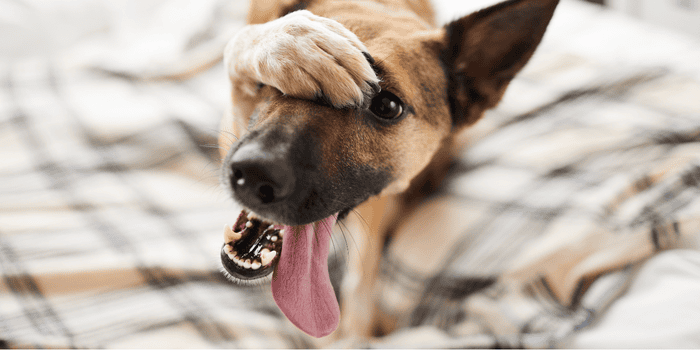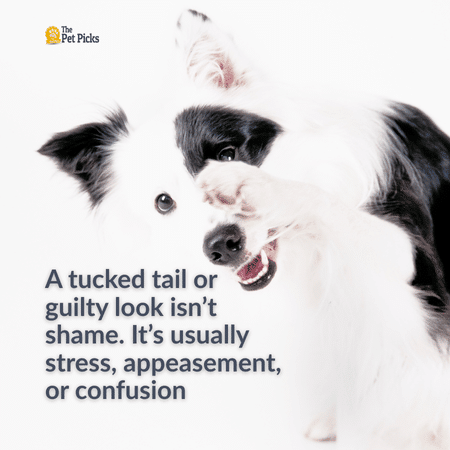When Your Dog Looks Awkward: Is It Embarrassment or Something Else?
We have all seen our dogs do something clumsy or awkward. Maybe they tripped while running or missed a jump onto the couch. Sometimes, after these moments, they tuck their tail, avoid our eyes, or retreat quietly. It feels almost as if they are embarrassed. But are they really feeling embarrassment, or are we simply projecting our own emotions onto them?
At ThePetPicks.com, we believe understanding our dogs’ emotions is part of the deep bond we share with them. Dogs are family, and knowing what they feel helps us support them better. So let’s explore what science, behaviorists, and veterinarians say about whether dogs get embarrassed, what their reactions mean, and how we should respond.
What Science Says About Canine Emotions
The question of embarrassment in dogs is more complex than it appears. Scientists agree that dogs feel a wide range of emotions, including joy, fear, anxiety, and affection. These emotions are well-documented and easy to observe. But embarrassment is considered a secondary emotion, meaning it requires self-awareness and a sense of how others perceive you.
Researchers debate whether dogs are capable of this level of self-consciousness. Many experts, like those cited by PetMD and Rover, suggest that what looks like embarrassment is more likely appeasement behavior. When a dog avoids eye contact, lowers their head, or tucks their tail, they are not necessarily embarrassed. Instead, they are trying to calm a situation, reduce tension, or show submission.
Still, some veterinarians and dog lovers argue that certain behaviors do look a lot like shyness or embarrassment. For example, a dog that hides after knocking something over or slinking away after failing at a trick might appear to be self-conscious. Whether or not this truly counts as embarrassment remains a matter of debate.

Common Situations We Label as Dog Embarrassment
Even if the scientific jury is still out, most dog parents can list moments that seem like pure embarrassment. Let’s look at some of the most common examples and what they might actually mean.
When They Slip or Stumble
A dog that stumbles during play and then pauses or slinks away may not feel embarrassed. Instead, they may be startled or reacting to our laughter. Dogs are incredibly tuned into human emotions. If we laugh loudly or react strongly, they might interpret that energy as confusing or even negative, causing them to retreat.
When They Fail at a Trick
If you have ever asked your dog to perform a trick and they got it wrong, you might notice them looking away or lying down. Many people call this embarrassment. In truth, it may be frustration, confusion, or an attempt to avoid pressure. Dogs want to please us, and when they sense they are not meeting expectations, they may display appeasement signals.
When They Wear Costumes or Clothing
Dog parents love dressing up their pets, but not all dogs enjoy it. A dog that freezes, lowers their ears, or hides while wearing clothing is not embarrassed in the human sense. They are uncomfortable, stressed, or unsure about the strange new sensation.
When We Scold Them
Perhaps the most famous example is the so-called “guilty look.” A dog that has chewed a shoe or made a mess often shows lowered posture, tucked tail, and averted eyes. While this looks like shame or embarrassment, research shows that dogs display these behaviors in response to our tone of voice or body language, not because they feel guilt.
How to Read the Signs Correctly
If we want to strengthen the bond with our dogs, the key is learning what their signals actually mean. Here are some of the most common behaviors mistaken for embarrassment and their true meaning:
- Tucked tail and lowered body: Often a sign of submission or fear.
- Avoiding eye contact: A calming signal meant to reduce tension.
- Lip licking or yawning: Stress-related behaviors that help dogs self-soothe.
- Backing away or hiding: Discomfort or confusion rather than embarrassment.
When we interpret these correctly, we can better respond to our dogs’ needs instead of assigning human emotions to them.
How to Respond When Your Dog Looks “Embarrassed”
As loving pet parents, our reaction matters. Whether our dogs feel embarrassment or not, they are definitely sensitive to our cues. The way we respond can either reassure them or add to their stress.
- Stay calm and gentle. If your dog looks awkward or uncomfortable, avoid scolding or laughing too loudly. Use a reassuring tone.
- Offer encouragement. Praise your dog when they try again after a stumble or failed trick. Positive reinforcement builds confidence.
- Watch their comfort level. If clothing, new environments, or certain activities make your dog uneasy, respect their limits.
- Give space if needed. Sometimes the kindest response is letting them retreat and reset without added pressure.
These small adjustments help our dogs feel safe and supported, no matter the situation.
Can Dogs Really Feel Embarrassment Like Humans?
The honest answer is that we do not know for certain. Current science leans toward “no.” Dogs likely do not experience embarrassment the way humans do, because embarrassment requires complex self-awareness.
But here is what we do know. Dogs are incredibly attuned to us. They read our reactions, respond to our body language, and adjust their behavior to maintain harmony in the relationship. What looks like embarrassment may simply be their way of navigating the bond they share with us.
So while dogs may not blush with embarrassment, they do show sensitivity to our feelings and actions. And that connection is just as powerful.

Extra Tips for Understanding Your Dog’s Emotions
- Pay attention to context. A tucked tail after slipping is different from a tucked tail during fireworks.
- Keep a diary of your dog’s reactions in different scenarios. Patterns will help you see whether it is stress, fear, or something else.
- Do not confuse humor with stress. What makes us laugh might actually make our dog uncomfortable.
- Work with a trainer if you see frequent stress signals. Professional support can help both you and your dog communicate better.
Wrapping It Up: Dogs and Their Awkward Moments
So, do dogs get embarrassed? Probably not in the same way humans do. But they do react in ways that look like embarrassment because they are responding to our cues, trying to appease us, or processing stress.
For pet parents, the takeaway is simple. When your dog looks awkward or guilty, focus less on labeling the emotion and more on supporting their comfort. By responding with reassurance, patience, and respect, you strengthen the trust that makes your bond unshakable.
At ThePetPicks.com, we call this Trust Born from Love. Our dogs may not feel embarrassment, but they do feel love, safety, and joy when we understand them. That is what really matters.
FAQs
Can dogs actually feel embarrassment?
Science says dogs probably do not feel embarrassment as humans do. Their behaviors that look like embarrassment are usually appeasement or stress signals.
Why does my dog look guilty when I scold them?
The “guilty look” is your dog responding to your tone and body language, not an actual sense of guilt or shame.
Do dogs know when they make mistakes?
Dogs know when their behavior triggers a reaction from us. They may associate an action with a consequence, but this does not mean they feel embarrassment.
Why does my dog hide after something awkward?
Hiding is a stress response. It means your dog is uncomfortable, not that they are embarrassed.
How can I help my dog feel more confident?
Use positive reinforcement, avoid harsh scolding, and give them time to adjust in new situations. Building confidence is more effective than assuming embarrassment.
A Loving Reminder
The information provided at ThePetPicks.com is based on research and expertise, aiming to enhance the bond between you and your dog. However, it’s essential to remember that every dog is unique. Always consult with professionals, like veterinarians or trainers, for specific concerns or advice. At ThePetPicks.com, we believe in “Trust Born from Love,” and we encourage every pet parent to make informed decisions rooted in love and care.


